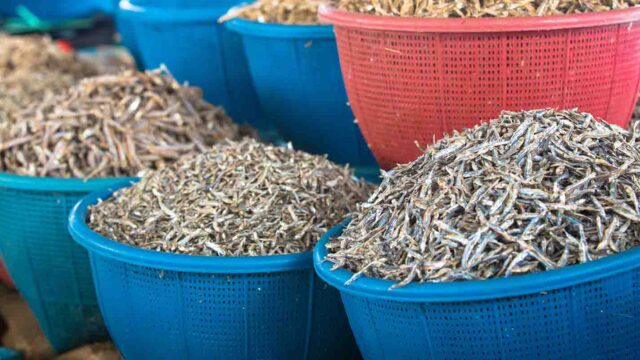Why the price of omena is going up
The shortage stems from Lake Victoria, where local fishermen source up to over 50 percent of the sardines.

The price of omena (silver cyprinid), a common household staple, has steadily risen to dizzying heights following an acute shortage in the markets.
Omena, a species of sardine, is a popular staple for families who need affordable fish in their meals and is sometimes the only source of protein for many during tough economic times.
For pet lovers, omena is also an affordable alternative to store-bought pet foods, which can often be too expensive and out of reach.
Nancy Gaitha, an omena vendor, has been selling the fish for two years, but it has become too expensive in the last two months.
“I cannot find it from the vendors I used to buy from. They say their stocks are not arriving from the lakeside, and when it comes, it is too expensive,” she said.
Usually, she would sell up to 10kg of omena a day, but now she is lucky if she can source 5kg.
Due to the undersupply, vendors like Nancy are buying a 10-kilogramme omena bucket at KSh 2,000, which is double the KSh1,000 before the shortage.
“I used to sell 150 grammes of omena at KSh 40, now I have no choice but to sell it at KSh 70 and most of my customers are complaining,” she said.
The shortage stems from Lake Victoria, where local fishermen source up to over 50 percent of the sardines.
Several factors have led to the decline in the sardines, namely, poor weather, post-harvest losses and a decline in the number of local boats going out to the Lake.
According to a 2020 report published in Frontiers in Environmental Science, “Lake Victoria’s Bounty: A Case for Riparian Countries’ Blue Economic Investment,” the lake’s resources are under threat.
“Fish are under threat from pressures caused by humans such as overfishing, alien species invasion, rising eutrophication, and climate change,” the report warned.
Researchers reported that omena, locally known as dagaa catches, have been on an upward trajectory since the early 1980s.
Currently, dagaa accounts for approximately 60% of the total catch, but substantial quantity and quality are lost due to poor weather, post-harvest handling and dwindling stocks.
Poor Weather
Lake Victorian dagaa is traditionally dried in the sun on the ground, grass, matting, or old fishing nets.
The process does not protect the product against rain, animals, insects, and soil contamination.
Currently, the region around Lake Victoria is experiencing short rains and this means most of the catch is destroyed or taking longer to dry.
Post Harvest Losses
This then causes fishermen to avoid going out to the lake as they are unable to offload the available stocks.
Consequently, dagaa fishermen face significant post-harvest losses, which are mainly rotting or spoilage (79.3%), followed by rain sweeping the fish back into the lake (10.3%) and loss of colour (3.4%).
If the deterioration of dagaa is halted right from capture, earnings from the fish could increase appreciably.
Lake Victoria is the world’s largest tropical lake, the second largest freshwater lake, and a vital shared resource of Uganda, Kenya, and Tanzania.
Dwindling fish stocks
Recently, all three East African countries have reported a decline in fish stocks from Lake Victoria, with Tanzania’s ‘The Citizen’ reporting that Prof Mohammed Sheikh, the Director of Fisheries in the Ministry of Livestock Development and Fisheries, had described the situation as alarming.
“The fish stocks in the freshwater lake shared by Tanzania, Uganda and Kenya have drastically declined by up to 35 percent,” he said.
Kenya Marine and Fisheries Research Institute (KMFRI) Director, Freshwater Systems Dr Christopher Aura said climate change is also affecting situation as the weather patterns have changed dramatically.
“Previously fishermen had sufficient sunshine to airdry the omena but now the weather is unpredictable, with the short rains extending. On sunny days it is now misty and cold which is leading to losses,” he said.
